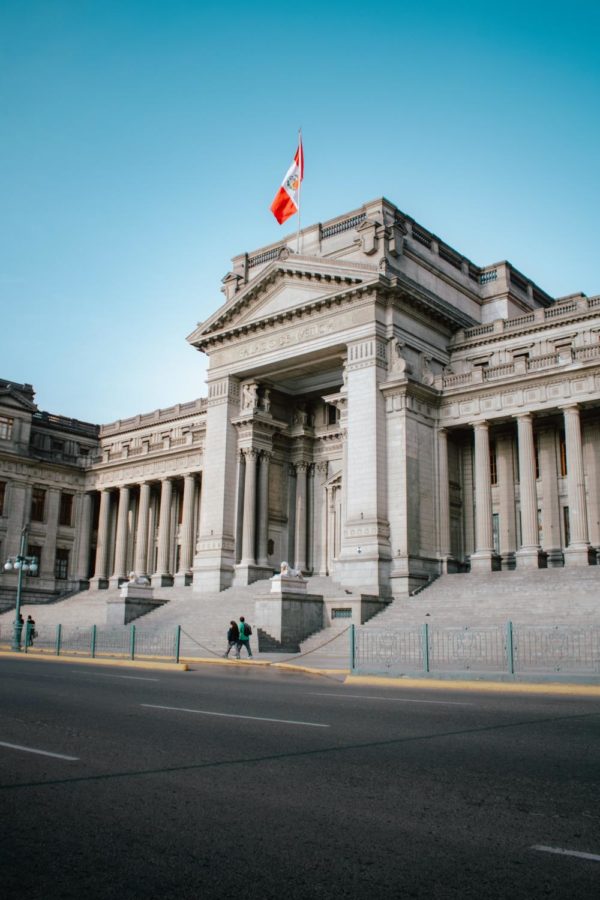Former Peruvian President Pedro Castillo Impeached and Arrested
December 19, 2022
On December 7, 2022, the former President of Peru, Pedro Castillo, was detained by police for accused crimes of “rebellion” and “conspiracy,” which break constitutional order, according to the country’s Public Ministry. Castillo was removed from office and arrested swiftly after being impeached by an overwhelming majority of voters in Congress. Only hours after his impeachment, former Vice President Dina Boluarte was been sworn in, inciting mixed reactions from Peruvians.
One significant factor that contributed to Castillo’s impeachment was his announcement on December 7, in which he detailed his plan to dissolve legislature and rule by decree, saying he will “re-establish the rule of law and democracy” (Aljazeera). Additionally, he introduced a curfew and used emergency powers to call for new elections. These actions were seen by many, such as the constitutional court of Peru, as an attempted coup. Before the members of Congress organized a trial to vote on the impeachment of the President, many government ministers resigned in form of protest. Federal prosecutors said that the reason for impeachment was Castillo’s violation of the constitution, saying, “Peru is a democratic and sovereign Republic … No authority can put itself above the Constitution and must comply with constitutional mandates” (Aljazeera).
Since the start of his term in July of 2021, there have been two previous votes to impeaching Castillo. While both of these attempts did not reach the two-thirds majority of votes needed, they have been similarly conducted due to prosecutors’ claims that Castillo violated the constitution. In October 2022 a constitutional complaint was made against Castillo for leading a “criminal organization” that benefitted from state contracts and obstructed investigations (Aljazeera). However, Castillo has condemned these allegations, accusing rivals of attempting to “blow up democracy and disregard our people’s right to choose” (Aljazeera). Castillo’s rule has been marked by frequent resignation of ministers and corruption scandals, which the leftist leader has dismissed as “politically motivated efforts by right-wing members of the opposition-controlled Congress, set on undermining his government” (Reuters). Furthermore, Castillo and other family members face six investigations into corruption, despite his denial of any misconduct.
Following his impeachment, Castillo was arrested while traveling to Mexico to request asylum, according to local press in Peru and a police report. Additionally, videos circulating on social media show police intercepting Castillo’s car to take him into custody. Mexico’s foreign minister said on Thursday, December 8, that Peruvian and Mexican authorities are consulting Castillo’s request. It is likely Castillo will receive asylum, however, as the Mexican President and fellow leftist, Andres Manuel Lopez Obrador, indicated he would be open to granting Castillo’s request. Since the arrest, however, Castillo has been taken to a police facility in eastern Lima, Peru’s capital.
In recent months, the Peruvian government under Castillo had suffered from instability, which in part led to his impeachment, as well as growing concerns from Peruvian citizens. For example, in November, thousands of demonstrators took to the streets of Lima to protest in favor of the resignation of Castillo. However, differing opinions have also emerged following the impeachment, with some of the hundreds of protestors voicing their support for Castillo. For example, phrases such as, “’The fight has begun! Free Castillo!” (Reuters) are held on signs by demonstrators. Additionally, some protests have created further conflict within the country, due to police firing tear gas.
Meanwhile, Castillo’s former Vice President, Dina Boluarte, has been sworn in as the first female President of Peru. She is also the sixth Peruvian President in the past five years, with the previous five all failing to serve a complete term. Boluarte is expected to announce the new cabinet members in the next few days, and she has stated that “I request a political truce to install a government of national unity… I ask for time, valuable time to rescue the country from corruption and misrule” (Aljazeera). While some are hopeful for a new leader in their country, others criticize the lack of democracy through Boluarte’s quick inauguration. Protestors argue that Boluarte should be elected by the people for her to be recognized as the legitimate President of Peru.
Furthermore, many international authorities have joined in condemning former President Castillo, with US State Department spokesperson, Ned Price, saying “We will continue to stand against and to categorically reject any acts that contradict Peru’s constitution, any act that undermines democracy in that country” (CNN). Argentina’s Ministry of Foreign Affairs has expressed their concern for Peru’s political crisis, and additionally, Brazil’s Ministry of Foreign Affairs issued a statement in reaction to Castillo’s actions, saying they were “incompatible with the constitutional framework of that country, [and] represent a violation of democracy and the rule of law” (CNN).



